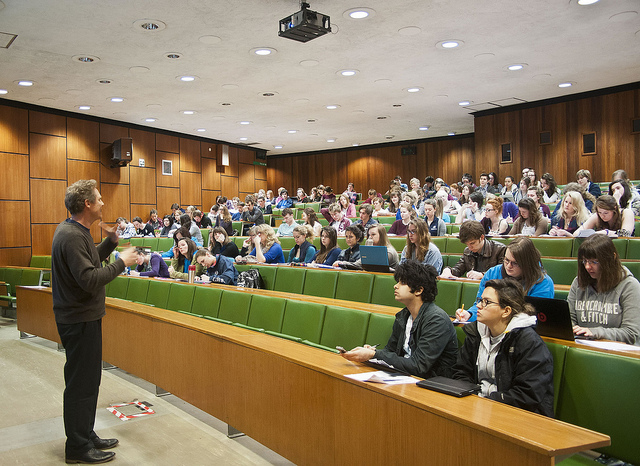 A typical lecture thereat at Liverpool Uni. Picture: LT5 on Flickr
A typical lecture thereat at Liverpool Uni. Picture: LT5 on Flickr
When the National Council for the Training of Journalists (NCTJ) recently released its report about the success or otherwise of students who had graduated from its courses, the findings caused barely a ripple of interest – even among the trade press.
Perhaps the report, Destinations of NCTJ diploma in journalism students, was pointing up the obvious to those already involved, with its findings that more than a third of those who studied for its diploma in journalism last year are not working for media outlets.
In addition the report showed that, of those who are employed, 19% are earning less than £10,000 and 3% were unpaid, while only 4% were earning more than £30,000.
And it’s certainly not a problem restricted to those journalistic hopefuls on NCTJ courses – those engaged with training on university courses are also questioning the value of what’s been offered in terms of answering the needs of the modern media landscape.
In a world where graduates are as likely to work on independent projects, or start out online and be valued more for their video editing skills than for the speed of their shorthand, is it time for an overhaul?
University of Central Lancashire’s (UCLan) Francois Nel is one of those airing the debate.
Speaking at a recent Westminster Media Forum event in London he told the audience: “The prospects of the majority of the journalism graduates getting employment in the mainstream media is very slim indeed.
“Journalism training in Britain is entrenched in a 20th century system that has a simple goal: to provide junior employees in the news industry.”
“We need to reduce the current emphasis on preparing students to meet the stated requirements of those formerly known as the employers and enforced through the training councils.
“And we need to open that debate wider on the issue in order to inform what is being taught in journalism courses, and how it is being taught and to what end.”
Leeds journalist and trainer Richard Horsman picked up on the issue in a recent blog post. He argues that it’s not just about course content but that Universities are ‘ill suited’ to training journalists.
“….there is a question to be asked, as numbers rise, about where all those with PhDs are to be gainfully employed at a time when the number of working journalists, in the sense of people actually paid to report and contextualise current events, is shrinking. If the answer is “within academia” we face the danger of those wanting to practice journalism being taught by those who’ve only ever studied it – or maybe did a few months freelancing on a magazine (and didn’t like it very much).”
In its conclusion to the report, the NCTJ is at pains to point out that the core skills taught on the course were valued by those who attended, regardless of whether they ultimately led to a job in journalism.
It said: “There is frequent debate about the continued usefulness of all the core skills (of reporting, law, public affairs and shorthand) taught on the NCTJ diploma.
“The results suggest that all are considered to have been useful in preparing them for work. Reporting and law are regarded as most useful, but public affairs and shorthand also receive positive responses – with 62 per cent believing that shorthand has been useful in preparing them for work and 65 per cent stating the same for public affairs.
“This is itself of interest, but one other result is worth noting: whilst it would be expected that those working in journalism jobs find the core skills to be more useful than those in non-journalism jobs, nearly half (46 per cent) of those working in non-journalism jobs still report that they found shorthand useful in preparing them for work.”
As the new intake of journalism wannabes prepare to take up their places at colleges and universities across the North, it remains to be seen whether a stunning shorthand outline will endure as sufficient reward to compensate for the £s of resultant student debt incurred.
You can read the full report here.








